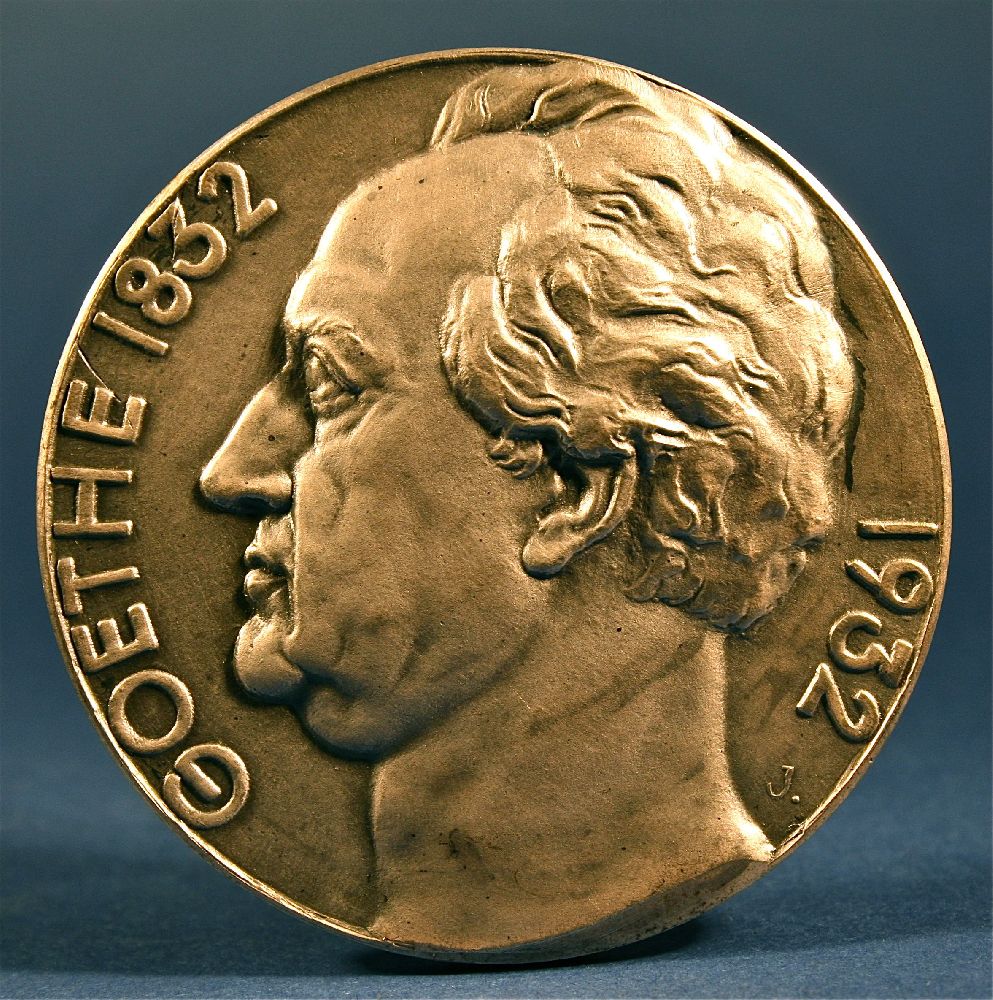

Title: Antique Goethe 1832 Commemorative Silver Art Medal German Coin
Shipping: $19.00
Artist: N/A
Period: 20th Century
History: N/A
Origin: Central Europe > Germany
Condition: Museum Quality
Item Date: 1832 to 1923
Item ID: 5901
One side - Goethe 1832 -1923 / Other side - Allianz Sportplatz Einweihung Frankfurt a. M. 11. 9. 1932 - E.F. Wiedmann Munz Prage Anstait Frankfurt a. M. COMMEMORATIVE MEDALS WORLD MEDALS Germany No.: 1530 Johann Wolfgang von Goethe (1749-1832), polymath, Silver Medal, 1932, It Comes In It's Box. Johann Wolfgang von Goethe (1749-1832), German poet, playwright, novelist, and natural philosopher is best known for his two-part poetic drama Faust, (1808-1832) which he started around the age of twenty three and didn't finish till shortly before his death sixty years later. He is considered one of the greatest contributors of the German Romantic period. "The highest happiness of man ... is to have probed what is knowable and quietly to revere what is unknowable."* * *"Take life too seriously, and what is it worth? If the morning wake us to no new joys, if the evening bring us not the hope ofnew pleasure, is it worthwhile to dress and undress?"Johann Wolfgang von Goethe (1749 - 1832)
Link: http://en.wikipedia.org/wiki/Johann_Wolfgang_von_Goethe
Johann Wolfgang von Goethe German, 28 August 1749 – 22 March 1832) was a German writer, artist, and politician. His body of work includes epic and lyric poetry written in a variety of metres and styles; prose and verse dramas; memoirs; an autobiography; literary and aesthetic criticism; treatises on botany, anatomy, and colour; and four novels. In addition, numerous literary and scientific fragments, and more than 10,000 letters written by him are extant, as are nearly 3,000 drawings.
A literary celebrity by the age of 25, Goethe was ennobled by the Duke of Saxe-Weimar, Carl August in 1782 after first taking up residence there in November of 1775 following the success of his first novel, The Sorrows of Young Werther. He was an early participant in the Sturm und Drang literary movement. During his first ten years in Weimar, Goethe served as a member of the Duke's privy council, sat on the war and highway commissions, oversaw the reopening of silver mines in nearby Ilmenau, and implemented a series of administrative reforms at the University of Jena. He also contributed to the planning of Weimar's botanical park and the rebuilding of its Ducal Palace, which in 1998 were together designated a UNESCO World Heritage Site.
After returning from a tour of Italy in 1788, Goethe published his first major work of a scientific nature, the Metamorphosis of Plants. In 1791 he was charged with managing the theatre at Weimar, and in 1794 he began a friendship with the dramatist, historian, and philosopher Friedrich Schiller, whose plays he premiered until Schiller's death in 1805. During this period Goethe published his second novel, Wilhelm Meister's Apprenticeship, the verse epic Hermann and Dorothea, and, in 1808, the first part of his most celebrated drama, Faust. His conversations and various common undertakings throughout the 1790s with Schiller, Johann Gottlieb Fichte, Johann Gottfried Herder, Alexander von Humboldt, Wilhelm von Humboldt, and August and Friedrich Schlegel have, in later years, been collectively termed Weimar Classicism.